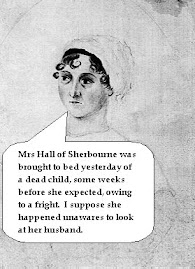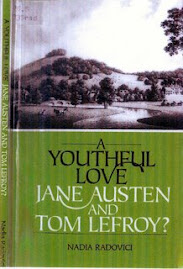Some critics, at least, got it right:
"[W]hen people compare Shakespeare and Jane Austen, they may mean that the minds of both had consumed all impediments; and for that reason we do not know Jane Austen and we do not know Shakespeare, and for that reason Jane Austen pervades every word that she wrote, and so does Shakespeare."
- Virginia Woolf (1913)
"Jane Austen was born before those bonds which (we are told) protected women from truth, were burst by the Brontes or elaborately untied by George Eliot. Yet the fact remains that Jane Austen knew more about men than either of them. Jane Austen may have been protected from truth: but it was precious little of truth that was protected from her."
- G.K. Chesterton (1913)
"Really, it is time this comic patronage of Jane Austen cased. To believe her limited in range because she was harmonious in method is as sensible as to imagine that when the Atlantic Ocean is as smooth as a mill-pond it shrinks to the size of a mill-pond. There are those who are deluded by the decorousness of her manner... into thinking that she is ignorant of passion. But look through the lattice-work of her neat sentences, joined together with the bright nails of craftsmanship, painted with the gay varnish of wit, and you will see women haggard with desire or triumphant with love, whose delicate reactions to men make the heroines of all our later novelists seem merely to turn signs, "Stop" or "Go" towards the advancing male."
- Rebecca West (1928)
"[Jane Austen's novels] appear to be compact of abject truth. Their events are excruciatingly unimportant; and yet... they will probably outlast all Fielding, Scott, George Eliot, Thackeray and Dickens. The art is so consummate that the secret is hidden; peer at them as hard as one may; shake them; take them apart; one cannot see how it is done."
- Thornton Wilder (1938)
Your Sunday Austen Meditation
3 years ago
















No comments:
Post a Comment